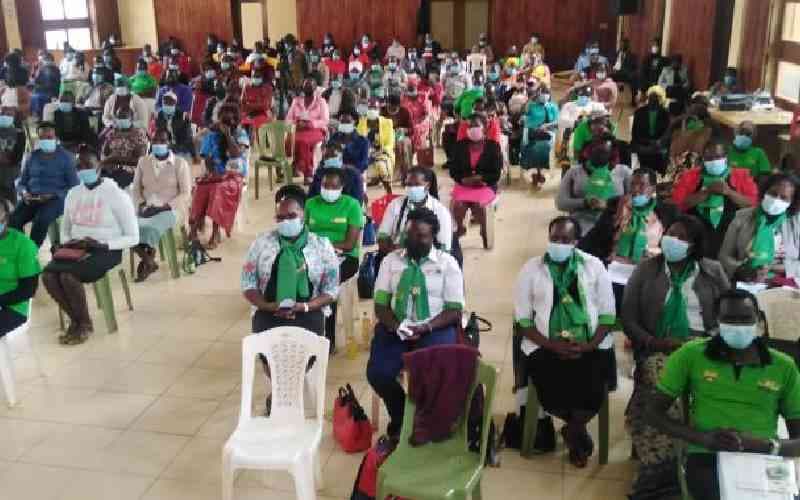We're loading the full news article for you. This includes the article content, images, author information, and related articles.
Government affirmative action funds like the Women Enterprise Fund and Uwezo Fund are injecting critical capital into female-led SMEs. However, experts and entrepreneurs say access to markets, advanced training, and high default rates present significant challenges to sustainable growth.

NAIROBI, KENYA – Government-led affirmative action funds have disbursed billions of shillings to empower women entrepreneurs, playing a crucial role in the growth of Micro, Small, and Medium Enterprises (MSMEs) across Kenya. The Women Enterprise Fund (WEF), since its inception in 2007, has disbursed over KSh 28 billion to more than 2.25 million women, according to a statement on Tuesday, October 28, 2025, by Everlyne Lusweti, the fund's Deputy Director of Marketing, Communication, and Research. Similarly, the Uwezo Fund has disbursed KSh 7.9 billion to over 82,000 groups, as announced by Susan Mang'eni, Principal Secretary for the State Department of MSMEs Development, on Tuesday, November 19, 2024.
These initiatives, designed as flagship programs under Vision 2030, aim to provide accessible and affordable credit to women, youth, and persons with disabilities, fostering economic growth from the grassroots. Beneficiaries often start with loans around KSh 100,000 and can scale up to KSh 750,000 upon successful repayment, coupled with mandatory capacity-building on financial literacy and business management. However, despite these significant financial injections, women entrepreneurs continue to face deep-seated systemic barriers that capital alone cannot solve.
While access to finance is a critical first step, it is not a silver bullet. A March 2025 report by Mastercard revealed that lack of funding (53%) is the primary challenge for Kenyan women in business, but it is closely followed by a lack of knowledge on how to scale their enterprises (47%) and develop a business plan (41%). This highlights a crucial gap between receiving initial capital and building a sustainable, high-growth business.
Many entrepreneurs, particularly in the informal and creative sectors, struggle to translate their passion into profit due to inadequate business acumen. Experts argue that for these funds to have a lasting impact, they must be integrated into a broader support ecosystem. This includes mentorship through entrepreneurial networks, which 48% of women identified as a key enabler, and specialized training in areas like digital marketing, cybersecurity, and strategic planning. Recent studies indicate a worrying trend where access to such influential networks and quality mentorship is diminishing for many women, hindering their ability to innovate and compete.
Furthermore, access to formal markets remains a major hurdle. According to Dr. Rutto of the Kenya National Chamber of Commerce and Industry (KNCCI), speaking at a dialogue on June 5, 2025, many women-led MSMEs are disconnected from scalable markets due to low visibility and weak infrastructure, a problem especially pronounced in rural areas.
The sustainability of these revolving funds is threatened by high default rates. An audit report cited by the Daily Nation on March 4, 2025, revealed significant weaknesses in credit risk management across several government funds. As of June 2024, the Uwezo Fund had KSh 5.17 billion in defaulted loans, while the Women Enterprise Fund reported KSh 2.5 billion in unpaid loans. In February 2024, Uwezo Fund officials noted that the default rate stood at 48%, with some challenges attributed to political misinformation encouraging non-repayment.
This situation casts doubt on the ability of the funds to recover loans and continue their mandate effectively. While officials are working to improve sensitization and loan recovery systems, the high default levels underscore the financial precarity of many small businesses and the need for more robust vetting and post-funding support.
There is a strong consensus that the path to empowering women entrepreneurs requires more than just credit. It demands intentional inclusion in procurement, partnerships, and digital access. Initiatives like the World Bank-funded NYOTA Project, which combines entrepreneurship training with seed capital and mentorship, point towards a more integrated model. Financial institutions are also exploring innovative solutions, such as using creative works as collateral, to address the fact that only a fraction of women-owned MSMEs have access to formal finance.
As Kenya works to formalize its vast informal sector, where many of these businesses operate, the focus must shift from merely providing loans to building a resilient ecosystem. This involves enhancing financial literacy, fostering strong mentorship networks, and creating clear pathways to larger markets. Only then can the billions disbursed by empowerment funds translate into sustainable prosperity for women entrepreneurs and the Kenyan economy at large.
Keep the conversation in one place—threads here stay linked to the story and in the forums.
Sign in to start a discussion
Start a conversation about this story and keep it linked here.
Other hot threads
E-sports and Gaming Community in Kenya
Active 9 months ago
The Role of Technology in Modern Agriculture (AgriTech)
Active 9 months ago
Popular Recreational Activities Across Counties
Active 9 months ago
Investing in Youth Sports Development Programs
Active 9 months ago